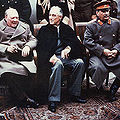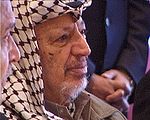Wikipedia:Selected anniversaries/February 4
This is a list of selected February 4 anniversaries that appear in the "On this day" section of the Main Page. To suggest a new item, in most cases, you can be bold and edit this page. Please read the selected anniversaries guidelines before making your edit. However, if your addition might be controversial or on a day that is or will soon be on the Main Page, please post your suggestion on the talk page instead.
Please note that the events listed on the Main Page are chosen based more on relative article quality and to maintain a mix of topics, not based solely on how important or significant their subjects are. Only four to five events are posted at a time and thus not everything that is "most important and significant" can be listed. In addition, an event is generally not posted this year if it is also the subject of the scheduled featured article or picture of the day.
To report an error when this appears on the Main Page, see Main Page errors. Please remember that this list defers to the supporting articles, so it is best to achieve consensus and make any necessary changes there first.
| ← February 3 | February 5 → |
|---|
Images
Use only ONE image at a time
-
Emperor Taizu of Song
-
Winston Churchill, Franklin D. Roosevelt and Joseph Stalin and the Yalta Conference
-
London low emission zone sign
-
Constantin von Tischendorf
-
Text from the Codex Sinaiticus
Ineligible
| Blurb | Reason |
|---|---|
| 1703 – All but one of the forty-seven rōnin committed seppuku (ritual suicide) in Edo, present-day Tokyo, as recompense for avenging the death of their master, Daimyo of Akō Asano Naganori. | unreferenced section |
| 1862 – Bacardi, one of the world's largest rum producers, was founded as a small distillery in Santiago de Cuba, Cuba. | need source for date |
| 1945 – World War II: Winston Churchill, Franklin D. Roosevelt and Joseph Stalin met at the Yalta Conference on the Crimean Peninsula to discuss Europe's postwar reorganization. | refimprove section |
| 1992 – Venezuelan Army officer Hugo Chávez failed in his attempt to overthrow the government of Carlos Andrés Pérez. | refimprove section |
| 1999 – Amadou Diallo, a 23-year-old immigrant from Guinea, was shot and killed by four New York City Police Department plain-clothed officers, prompting outrage both within and outside the city. | refimprove section |
| 2002 – Cancer Research UK, the world's largest independent cancer research charity, was formed from the merger of two competing cancer charities. | primary sources |
| 2003 – Under a new Constitutional Charter, the Federal Republic of Yugoslavia was reconstituted into a loose confederation of Serbia and Montenegro. | refimprove section |
| 2004 – Four Harvard University students launched the social networking website Facebook from their dorm room. | multiple issues |
| 2006 – A stampede at the PhilSports Stadium in Pasig City, Metro Manila, in the Philippines, killed 78 people and injured about 400. | refimprove |
| 2010 – The Federal Court of Australia's ruling in Roadshow Films Pty Ltd v iiNet Ltd set a precedent that Internet service providers (ISPs) are not responsible for what their users do with the services the ISPs provide them. | lots of {{cn}} tags |
Eligible
- 960 – Emperor Taizu began his reign in China, initiating the Song dynasty that eventually lasted for more than three centuries.
- 1797 – The Riobamba earthquake, the most powerful in the history of Ecuador, devastated Riobamba and many other cities, causing at least 6,000 casualties.
- 1801 – John Marshall became the fourth Chief Justice of the United States; his court opinions helped lay the basis for American constitutional law and made the Supreme Court a coequal branch of government.
- 1899 – The Philippine–American War opened when an American soldier, under orders to keep insurgents away from his unit's encampment, fired upon a Filipino soldier in Manila.
- 1945 – World War II: U.S. Army forces liberated the Santo Tomas Internment Camp in Manila, the largest of the Japanese internment camps in the Philippines.
- 1974 – The Provisional Irish Republican Army bombed a motor coach carrying off-duty British Armed Forces personnel and their family members, killing twelve.
- 1974 – American newspaper heiress and socialite Patty Hearst was kidnapped by the Symbionese Liberation Army, which she later joined in one of the most well-known cases of Stockholm syndrome.
- 1975 – Haicheng, Liaoning, China, was struck by a magnitude 7.3 ML earthquake, but the death toll was relatively low thanks to evacuations ordered by the government.
- 1998 – A magnitude 5.9 MW earthquake struck northern Afghanistan, triggering landslides that killed over 2,300 people and destroyed around 15,000 homes.
- 2008 – The London low emission zone, governing what types of vehicles may enter Greater London, came into being.
- Born/died this day: Oliver Ames (b. 1831) · Jenny Shipley (b. 1952)
February 4: Independence Day in Sri Lanka (1948)
- 1169 – A strong earthquake struck the eastern coast of Sicily, causing at least 15,000 deaths.
- 1859 – German scholar Constantin von Tischendorf rediscovered the Codex Sinaiticus, a 4th-century uncial manuscript of the Greek Bible, in Saint Catherine's Monastery at the foot of Mount Sinai in Egypt.
- 1969 – Yasser Arafat (pictured) was elected chairman of the Palestine Liberation Organization.
- 1999 – The Panamanian-flagged freighter New Carissa ran aground near Coos Bay, Oregon, causing one of the worst oil spills in the state's history.
- 2015 – Shortly after takeoff from Taipei Songshan Airport, the crew of TransAsia Airways Flight 235 shut down the wrong engine in response to a flameout, leading to a crash that resulted in 43 deaths.
Ceolnoth (d. 870) · Carl Michael Bellman (b. 1740) · Karen Carpenter (d. 1983)






